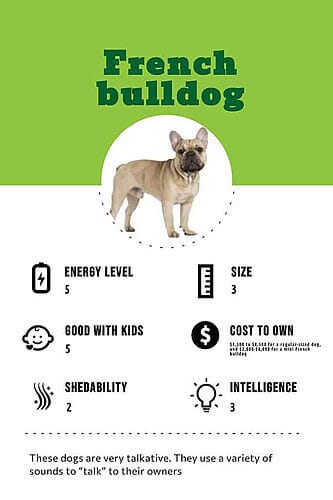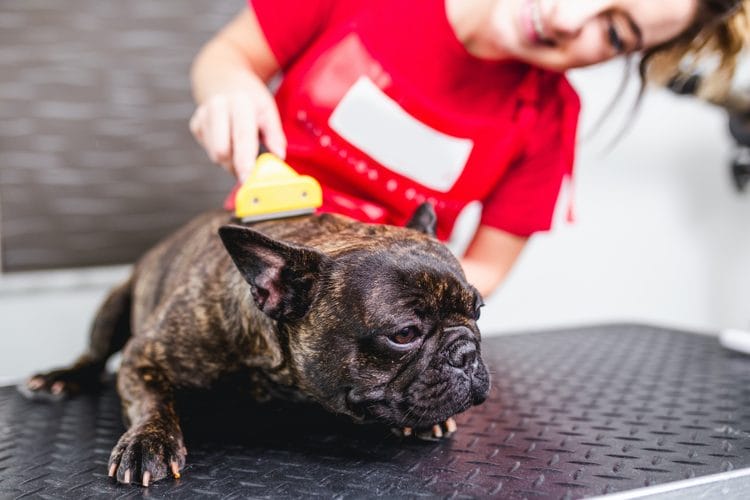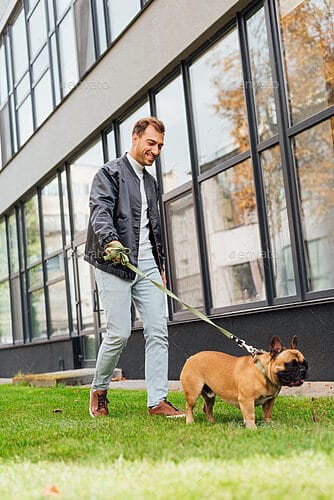French Bulldogs: The Ultimate Guide to This Charming Companion

French Bulldogs have exploded in popularity in recent years, captivating hearts with their adorable bat ears, compact dog breed size, and undeniably charming personalities. Whether you’re considering welcoming a French Bulldog puppy into your life or are a current Frenchie owner looking to learn more about your beloved companion, this comprehensive guide has everything you need to know about this companion dog breed.
Contrary to their name, actually hail from England! In the mid-19th century, Toy Bulldogs were bred down in size and crossed with Parisian ratters, resulting in the foundation stock of the breed we know and love today.
Quick Facts About French Bulldogs

- Origin: England (developed in France)
- Size: Small (under 28 lbs)
- Breed Group: Non-Sporting
- Lifespan: 10-12 years
- Coat: Short, smooth, and low-shedding (comes in various colors and patterns)
- Temperament: Playful, affectionate, adaptable
- Exercise Needs: Moderate (daily walks and playtime)
- Training: Moderately easy to train (positive reinforcement methods recommended)
- Health: Prone to certain health concerns due to their brachycephalic build (more on this later)
- Popularity: One of the most popular dog breeds in the world
“A dog is the only thing on earth that loves you more than he loves himself.” – Josh Billings
This quote perfectly embodies spirit. These devoted companions are known for their unwavering loyalty and eagerness to please.
French Bulldog Appearance: A Standout in the Crowd
French Bulldogs are instantly recognizable by their bat ears, a hallmark feature that sets them apart from other breeds. Their compact dog breed size makes them well-suited for apartment living, while their short, smooth coat requires minimal grooming.

French Bulldog Temperament: A Winning Personality
Boast a playful and affectionate nature, making them excellent companions for families with children (with proper supervision, of course). Their adaptability allows them to thrive in various living situations, from bustling city apartments to suburban homes.
Living with a French Bulldog: Considerations for Every Stage
French Bulldog Puppies: Thinking about welcoming a puppy into your home? This section should delve into preparing your living space for a new arrival, essential puppy supplies, and helpful tips for those first few weeks with your furry friend.

French Bulldog Breeders vs. Adoption: There are two main ways to acquire a French Bulldog: purchasing a puppy from a reputable breeder or adopting an adult dog from a shelter or rescue organization. This section should discuss the pros and cons of each option, including a brief discussion on the average French Bulldog price from responsible breeders.
Considering Adopting a Senior French Bulldog? Senior French Bulldogs can make wonderful companions! They often come with pre-established personalities and require less training than puppies. This section can explore the specific needs of senior and the joys of adopting an older dog.
French Bulldog Care: Keeping Your Frenchie Happy and Healthy
Providing proper care for your dog is essential for a long and happy life together. This section should cover the following aspects of French Bulldog care:

- Feeding: Have specific dietary needs due to their short snouts (brachycephaly). Discuss appropriate food choices and portion control.
- Exercise: While compact dog breeds, still require moderate exercise to maintain a healthy weight and prevent boredom.
- Grooming: Their short coat is relatively low-maintenance, but regular cleaning of their facial wrinkles is crucial to prevent skin irritation.
- Training: intelligent and eager to please, making them moderately easy to train with positive reinforcement methods.
- Veterinary Care: Regular vet checkups are essential for monitoring your dog’s health, especially considering their brachycephalic build.
French Bulldog Health: A Focus on Brachycephaly
French Bulldogs, like other brachycephalic dog breeds** with flat faces, are prone to certain health concerns. This section should discuss common health problems associated with brachycephaly, such as breathing difficulties, overheating, and eye issues. It’s crucial to emphasize the importance of purchasing from a responsible breeder who prioritizes health testing in their breeding stock.
Finding Your Perfect French Bulldog
French Bulldog Breeders: Responsible breeders prioritize the health and well-being of their dogs. This section can offer tips on identifying reputable breeders and what questions to ask before purchasing a puppy.
French Bulldog adoption is a fantastic option for those looking to welcome a loving companion into their lives. These charming dogs often find themselves in shelters or rescue organizations due to various reasons. Here are some of the benefits of adopting:
- Giving a Dog a Second Chance: You’ll be providing a loving home to a dog in need.
- Variety of Ages and Personalities: Shelters and rescues have all ages and personalities, allowing you to find the perfect fit for your lifestyle.
- Affordability: Adoption fees are typically significantly lower than the cost of purchasing a puppy from a breeder.
French Bulldog Adoption Centers in the US
Here are a few reputable French Bulldog adoption centers in the US to get you started:
- Rescue Network: https://frenchbulldogrescue.org/foster-dogs/
- SNORT Rescue (serving the Northeast US): https://www.snortrescue.org/pj-categs/adoptable-dogs/
- Rocky Mountain Rescue: https://www.rmfbr.org/our-dogs/foster-me/
The Joy of Bringing Home a French Bulldog Puppy
Whether you choose to adopt or purchase a puppy from a responsible breeder, welcoming into your life is an exciting experience. This section can offer valuable advice on preparing your home for a new arrival, essential puppy supplies, and helpful tips for those first few weeks with your furry friend.

Conclusion: A Lifelong Bond with a French Bulldog
More than just adorable faces with bat ears; they are loyal, affectionate, and adaptable companions who bring joy to countless families worldwide. Responsible pet ownership is essential, and this guide has equipped you with the knowledge to make informed decisions about.
Call to Action: Visit Pets Care Tips for more informative articles on various dog breeds and pet care!
Are French Bulldogs hypoallergenic?
No, not hypoallergenic. While they shed minimally, they can still trigger allergies in some people.
Do French Bulldogs bark a lot?
Can be prone to barking, but proper training and socialization can help minimize excessive barking.
How much does it cost to adopt?
Adoption fees for vary depending on the rescue organization and the dog’s age and medical history. However, they are typically significantly lower than the cost of purchasing a puppy from a breeder.
What are some good names for a French Bulldog?
This is a fun question to ponder! Consider your dog’s personality and appearance when choosing a name. Here are a few ideas to get you started: Wrinkles, Button, Truffle, Coco, Fig, or Pepper.
We hope this comprehensive guide has provided valuable information. With proper care and love, your Frenchie will be a cherished companion for years to come!
Petscaretip – How To Care Your Pets
Address: 809 Dallas St, Houston, TX 77002, USA, Houston, TX, United States, Texas
Email: [email protected]









